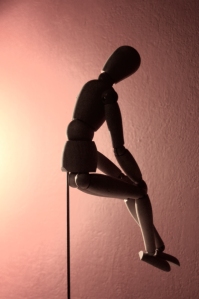This week is Mental Health Week. Despite the fact that 1 in 5 Australians will suffer from a mental illness in any given year, there is still far too much stigma surrounding it.
The following post is part 1 of 2 written by a friend of my about her experience of living with a mental illness. For more info about mental health visit Beyond Blue or Black Dog Institute.
The Uncomfortable D or The worst Six Things about Living with Mental Illness
The Stigma
So you’re having a good day, and then, out of the blue, a friend tells you they’ve got cancer. How do you respond to that?
The correct answer, for all you sociopaths out there, is with sympathy. As a halfway decent friend you’ll support them – bake cookies for them, come visit them in hospital, back them up as much as you can. After all it isn’t their fault, – cancer can happen to anyone.
Now imagine that same friend told you they had a mental illness. Would your attitude be the same?
My guess is no. If you’re like most people I know, your response is going to be less ‘Oh my God, I’m so sorry. What can I do?’ and more ‘Wow, this conversation just took a really awkward turn.’
Why is that? Why does having one chronic, life altering and (at times) deadly disease get you sympathy, while admitting to the other gets you shunned? And having a mental illness will get you shunned – not as badly as in the past perhaps, but even today admitting to depression, bipolar or schizophrenia in a job interview is a sure-fire way to never hear from them again.
Live with mental illness, and you’ll find yourself splitting the world into two categories, those who can know and those who can’t. The difficulty is in knowing which is which. Tell the wrong person and that’s the end of the conversation and possibly the relationship as well. I try to be an honest person, but if a stranger asks me why I don’t work, I tell them I have chronic fatigue.
But why do I have to lie about it? – Asks the small green alien who’s right now reading this from Rygel 12. You have a disease, and surely one disease is no worse than another. Well, life form from another world, I lie because here on Earth, admitting to a mental illness is tantamount to admitting that you regularly talk to small green aliens from the planet Rygel 12. Tell people that you’re mentally ill, and suddenly that’s all they can see.
I can’t tell you how much I hate being defined by my disease. I’m crazy, but I’m also a good flatmate, good sister and occasionally a good cook. I’m crazy, but that doesn’t make me any less of a person. I am more than my messed up head, so don’t judge me on it. And don’t judge me by what shows up on the news, because if you judge any of us by that the Rygelians will wipe us out for the good of the galaxy.
The Attitudes
Someone once told me that mental illness is the rape of the disease spectrum. After being outraged and offended, I actually came to realise that they had a point. Mental illness and rape are the only cases in their respective fields where it’s acceptable to blame the victims.
Yes, I know that’s not always true. Decent, rational people everywhere recognise that a woman wearing a short skirt is not asking to be raped, that the crime is always the fault of the criminal, and that the perpetrators should be castrated with a hot poker and a spoon, but we’re not all decent people, and we’re certainly not always rational.
With mental illness it’s the same – the responsibility for the disease is placed, not on the bastard son of circumstance and genetics, but on the sufferers, as though we’re sick because of some weakness within us, or because we don’t have the right attitude.
I have been told (or yelled at, to be honest) to just get better, to get over it, as if my disease is somehow under my control, as if I’m just pretending, or doing it for the attention. For what other illness would that attitude be acceptable? How many cancer sufferers do you know get told that they’re not trying hard enough?
‘We all get sad sometimes – I just don’t dwell on it,’ ‘There’s plenty of people out there who have it worse than you,’ ‘You’d be more loved if you made yourself more lovable,’ – these are all phrases I’ve heard, from people who are genuinely trying to help, mind, and all fundamentally fail to understand the problem. I’m not just sad – my brain has forgotten how to be happy. People might have it worse, but I’m feeling pretty bad right now. I need to be loved, because I no longer love myself.
The Loneliness
Earlier I mentioned visiting friends in hospital, something that I hope most have you have done at some point, or you will do if someone you know gets sick, (if you know someone who is currently sick consider this a hint). Hospitals are unpleasant places at the best of time, and seeing a friendly face really helps you get through it.
I mention this because, back when I was first diagnosed I spent two months in a mental hospital, and other than my magnificent family I was visited by exactly one friend, once, and that hurt more than all of the other stuff that was happening to me.
And that was back when I actually had friends, before I got put in the ‘too hard’ basket because I kept skipping meetings, and my agoraphobia got so bad I couldn’t leave my house.
Do you have any idea how hard that is? To struggle to relate to people who can’t really understand what you’re going through, and frankly are too put off by your illness to even try? And it’s not like I’m not a social person. One day I’d like to meet someone, have a family (although the thought of passing this onto my kids is terrifying), but the way things stand it feels like that’s never going to happen. My disease pretty much guarantees I’ll be miserable for the rest of my life, do I have to be alone too?
(to be continued…)
 This is beautiful, yet temporary hope in this broken world.
This is beautiful, yet temporary hope in this broken world.


